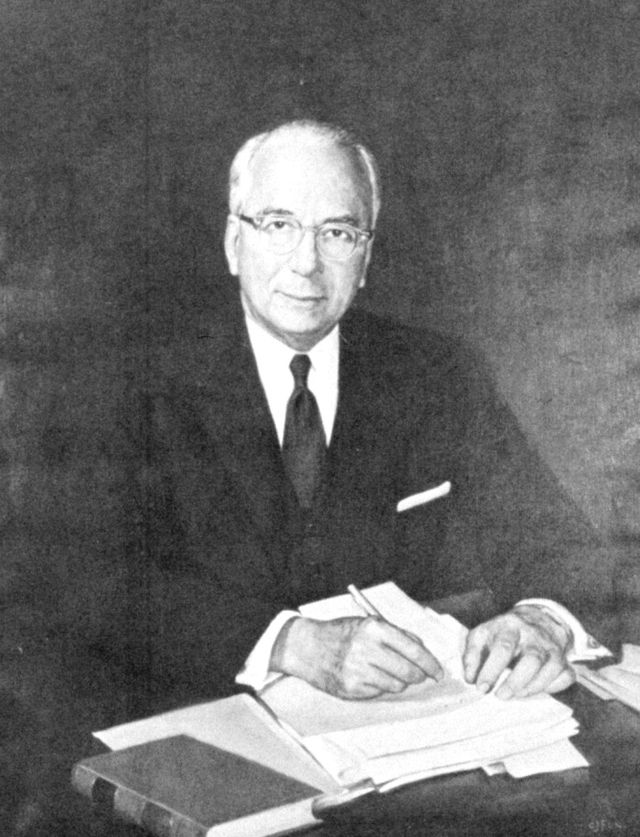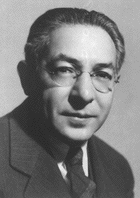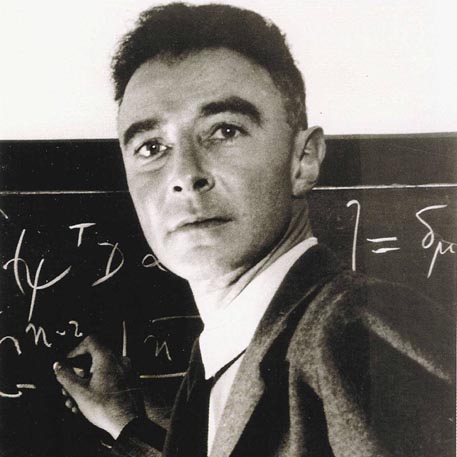In 1954, J. Robert Oppenheimer was called before a tribunal of the Atomic Energy Commission (AEC) for a hearing on his past involvement with communist organizations, the safety of his continued security clearance, and the possibility that he was a Soviet spy. As a result, his security clearance was revoked, bringing disgrace to Oppenheimer and provoking outrage among his scientific peers. The story surrounding Oppenheimer’s “trial” is one of both scientific and political intrigue.
Oppenheimer’s Politics
For much of his early life, Oppenheimer was not concerned with politics. He was so isolated from the day-to-day world that he did not learn about the 1929 stock market crash until several months after the fact. It took the political shockwaves of the 1930s – the worldwide depression, and the rise of fascism – to catch Oppenheimer’s interest.
His newfound political curiosity was combined with his association with young love interest Jean Tatlock, a sporadic member of the American Communist Party. Around the time that Oppenheimer began to work at University of California, Berkeley, his social circle grew to contain a number of either American Communist Party (CPUSA) members or “fellow travelers” – those who sympathized with communism, but were not themselves members of the communist party. This included his brother, Frank Oppenheimer, who joined the Communist Party in late 1937.
Oppenheimer was likely sympathetic to the communist goals, although it is unclear whether or not he ever joined the CPUSA proper. David Hawkins, a friend of Oppenheimer’s at Berkeley, described his and Oppenheimer’s political position as “pulling the New Deal to the left. That was our mission in life.”
Oppenheimer hosted communist philosophical and political discussion groups at his home several times. On a Manhattan Project security questionnaire, he half-jokingly wrote that while he had never been a communist, he had “probably belonged to every Communist-front organization on the West Coast.”
In early 1943, after he had been named director of the Manhattan Project, Oppenheimer was approached by Haakon Chevalier, a Berkeley professor of French and an old friend from within the communist movement. Chevalier told Oppenheimer that he knew of a way to pass information to the Soviets. Oppenheimer rejected Chevalier’s offer, but also did not report it for another eight months.
While Oppenheimer’s communist affiliations were considered cause for alarm, they did not stop him from being hired on to the Manhattan Project. When General Leslie R. Groves was first considering Oppenheimer for the job, Oppenheimer’s background turned up his communist past. General Groves used his overriding power to wave Oppenheimer through, insisting that he be granted clearance regardless of his communist past.
Before the Hearing
On August 29, 1949, The Soviet Union conducted its first successful nuclear test. This was well ahead of the schedule of most American projections, which suggested 1951 at the earliest, with General Groves claiming that the Soviets would not have the bomb until the ‘60s or ‘70s.
American officials became concerned with finding a way to renew American nuclear supremacy. They became increasingly interested in Edward Teller’s work on fusion nuclear weapons. Teller, along with other members of the Eisenhower administration, supported further development of “strategic,” high-yield nuclear weapons, which would likely be handled by the Air Force. Oppenheimer, by contrast, pushed back against the development of strategic fusion weapons, preferring that America increase its stock of “tactical” fission weapons. Oppenheimer was deeply concerned about the potential dangers of nuclear weapons, seeing Teller’s strategic weapons as really only possibly being used against civilian populations.
Oppenheimer’s combative nature and caustic tongue made him no friends, and several enemies, including AEC Chairman Lewis Strauss. Oppenheimer had several years earlier humiliated Strauss at a Congressional hearing about whether or not to ban the sale of radioisotopes. Unfortunately, it was Strauss whom Oppenheimer was fighting against in the fight over America’s future nuclear policy.

In November of 1953, William Liscum Borden, former executive director of Congress’s Joint Atomic Energy Committee, sent a letter to J. Edgar Hoover, then director of the FBI. Borden had spent several months inquiring after the FBI’s investigation into Oppenheimer’s background, and had compiled a list of evidence which he thought would suggest that Oppenheimer was, more likely than not, a Soviet spy. Borden had been a close confident of Lewis Strauss, who had more than likely encouraged Borden’s investigation.
Borden was convinced that the stances Oppenheimer had been taking on American nuclear policy were actively destructive. Borden’s letter said that Oppenheimer, having been chairman of more than thirty-five advisory groups on nuclear policy, had been in a position to substantively affect American policy. It further elaborated Borden’s twenty-one reasons that “more probably than not J. Robert Oppenheimer is an agent of the Soviet Union.”
Hoover had been aware of Oppenheimer’s past for years, but with McCarthyism reaching its apex, the time was particularly importune for it to come to light. Borden’s communication was passed on to President Eisenhower, who decided to lower a “blank wall” between Oppenheimer and the nation’s secrets.
Simultaneously, the Atomic Energy Commission ordered a security proceeding against him, which would be prosecuted judiciously over the coming weeks. On December 21, 1953, then-Chairman of the AEC Lewis Strauss informed Oppenheimer that his security clearance had been suspended following a review of his file, and suggested that he resign. Oppenheimer refused, instead demanding a hearing be held. Strauss, the man whom Oppenheimer had offended with both his words and his policy, would serve as chief appellate judge.
The Hearing
Oppenheimer hired well-known lawyer Lloyd K. Garrison, who cleared his schedule and agreed to do the case pro bono. Oppie faced twenty-four charges. Twenty-three of them had to do with his alleged Communist associations, including organizations he had supported, papers he had subscribed to, donations to the Spanish Republican war effort, his relationship with his communist brother, sister-in-law, and former fiancée, and the potential breach of information with Chevalier. The last charge was concerned with his alleged misconduct concerning the hydrogen bomb: altering estimates of the bomb’s feasibility, opposing its development, and declining to cooperate even when Truman granted the H-Bomb project a go-ahead.
The hearing began on April 12, 1954, in a temporary building off Constitution Avenue, close to the White House. It took place in an office converted into a makeshift courtroom. Oppenheimer’s friend Joseph Volpe later described it as, “like a hearing on your wife after you’ve been married twenty years.” It was unclear to the defense by which rules the court was playing, whether a hearing was being held, or a trial.
.jpg) The defense suffered from a lack of access: none of Oppenheimer’s defense team had security clearance, and therefore they could not see pivotal documents, including information from Oppenheimer’s FBI file and some of his own writings, that the prosecution had access to. Oppenheimer served as the defense’s memory, but frequently censored himself, out of a fear of unintentionally spilling classified information.
The defense suffered from a lack of access: none of Oppenheimer’s defense team had security clearance, and therefore they could not see pivotal documents, including information from Oppenheimer’s FBI file and some of his own writings, that the prosecution had access to. Oppenheimer served as the defense’s memory, but frequently censored himself, out of a fear of unintentionally spilling classified information.
Further challenging the defense was the fact that the prosecution had access to wiretap recordings of their conversations. Before, during, and after the hearing, Strauss or the prosecuting attorney Roger Robb read at least 273 wiretapped reports, including communications between Oppenheimer and his attorneys, and within the entire defense team.
The hearing began with Oppenheimer on the stand, answering Garrison’s questions about his professional conduct and years of service. He was then cross-examined by Robb, who grilled him on the Chevalier affair. Oppenheimer testified for a total of twenty-seven hours across several days, growing increasingly weary from Robb’s pointed questioning.
Oppenheimer’s testimony was interspersed with statements from others. General Groves, then retired, affirmed his choice to hire Oppenheimer and place him in charge of Los Alamos, and said that he would be “amazed” if Oppenheimer had ever been disloyal.
Edward Teller testified against Oppenheimer, and when asked if he believed Oppenheimer to be a security risk, responded: “In a great number of cases, I have seen Dr. Oppenheimer act – I understand that Dr. Oppenheimer acted – in a way that for me was exceedingly hard to understand. I thoroughly disagreed with him in numerous issues and his actions frankly appeared to me confused and complicated. To this extent I feel that I would like to see the vital interests of this country in hands which I understand better, and therefore trust more.” For this testimony, Teller was actively rejected and shunned by much of the scientific community for many years.
At the end of the hearing, Oppenheimer’s clearance was revoked by a two to one vote of the panel. It assented to twenty of the twenty four charges. It affirmed that Oppenheimer was associated with a number of communist activities, but also concluded that he was a loyal citizen, who had practiced a great deal of circumspection. However, it objected strongly to the Chevalier incident. No person with such associations, they said, could be trusted with security clearance. Oppenheimer lost his clearance less than twenty-four hours before his contract was to be up and his clearance was to lapse anyway.
Aftermath
 The results of the hearing provoked outrage within the scientific community. Oppenheimer was seen as a martyr to McCarthyism. Wernher von Braun said before a Congressional hearing, “In England, Oppenheimer would have been knighted.” Einstein quipped that “AEC” should stand for “Atomic Extermination Conspiracy.” David Lilienthal, a former Chairman of the AEC, wrote in his diary, “It is sad beyond words. They are so wrong, so terribly wrong, not only about Robert, but in their concept of what is required of wise public servants.” Edward Teller was shunned by a great part of the scientific community. Nobel Prize-winning physicist Isidor I. Rabi once suggested that “It would have been a better world without Teller.”
The results of the hearing provoked outrage within the scientific community. Oppenheimer was seen as a martyr to McCarthyism. Wernher von Braun said before a Congressional hearing, “In England, Oppenheimer would have been knighted.” Einstein quipped that “AEC” should stand for “Atomic Extermination Conspiracy.” David Lilienthal, a former Chairman of the AEC, wrote in his diary, “It is sad beyond words. They are so wrong, so terribly wrong, not only about Robert, but in their concept of what is required of wise public servants.” Edward Teller was shunned by a great part of the scientific community. Nobel Prize-winning physicist Isidor I. Rabi once suggested that “It would have been a better world without Teller.”
Oppenheimer himself retired from public administration, although he remained a controversial figure. As late as August 25, 1954, the FBI was still concerned about an “Operation Oppenheimer,” which they thought would involve the Soviets stealing the Oppenheimers away behind the Iron Curtain. Meanwhile, Oppenheimer himself received the support of the American public, as the release of the full transcript of the hearing as In the Matter of J. Robert Oppenheimer showed the prosecution’s malfeasance. Oppenheimer went on to help found the World Academy of Arts and Sciences in 1960. He also continued to lecture and write on physics. He died in 1967, at the age of 62.
His daughter, Toni Oppenheimer, would go on to pursue a career in trilingual translation, applying for a job at the United Nations. However, the job required security clearance, and the FBI did a full investigation of Toni’s background. Likely because of the prior revoking of her father’s credentials, Toni never received security clearance to pursue the job she loved. In January of 1977, she committed suicide.





